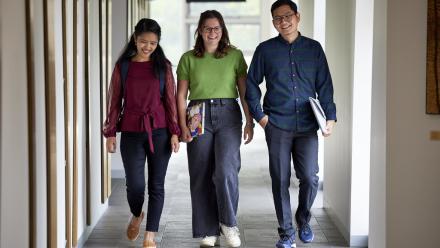New interactive learning project launches at ANU
A new project aimed to transform the style of teaching and learning from a traditional top-down, lecture-style approach to a more interactive experience for students, has been launched on campus.
The iLEAP, or Interactive Learning Project, is about providing significant support to academic colleges and course convenors to redesign courses to provide a more modern way for students to learn.
Speaking at the launch of iLEAP at the Marie Reay Teaching Centre, Acting Deputy Vice-Chancellor (Academic), Professor Grady Venville, said iLEAP was a result of successful consultation with the colleges and the ANU community.
"What teachers do is vital but what students experience is really critical too," she said.
The iLEAP project is a partnership between ANU Online, CHELT, ITS and the other central teams and the colleges who have been integral to the project's design.
Under the partnership, a new central team will provide expertise, localised support, grant funding, expertise, professional development and resources to showcase and reward excellence in teaching and learning.
Over the coming months, Colleges will be to identify course convenors to think about how learning and teaching can be enhanced and to provide support and mentorship within the college, and collaborate across colleges.
"For students, the partnership is about enthusiastic participation, but most importantly it's about how we evaluate how we're going and to give us feedback - real insight into their learning experience," Professor Venville said.
"In turn it's really important that we value that student feedback and listen to it."
Professor Venville described the new iLEAP project as being a ground-up approach rather than top down.
"It's about providing direct and intensive support to course convenors. It's a real collaborative commitment."
ANU Students' Association President Eden Lim says the new strategy is an exciting step forward for the University.
"A lot of hard work, thought and passion has definitely gone into this and it's quite incredible to see it come to fruition," she said.
"It's truly something that I believe has the potential to change and improve the teaching and learning experience of the students here at the ANU and has the potential to demonstrate what can be achieved through student partnership."
President of the Postgraduate and Research Students' Association, Zyl Hovenga-Wauchope, who went through a Steiner education when he was at school, said he has experienced many different forms of learning from a traditional classroom through to online forums.
"My experience of interactive learning and teaching is quite diverse and I am very positive about the opportunities that are afforded by trying to think of teaching in ways that are more than just a one-way presentation but are more about an interaction between the teacher and learner."
Vice-Chancellor Professor Brian Schmidt said excellence in education is achieved through having a vision that is supported by purposeful actions and training to help achieve the vision.
"If we're going to invest all this effort and money into a building like this, we need to up our investment in actually making sure we can teach into it with that same ingenuity that came to this building."
Professor Schmidt said the new teaching spaces reward thought and organisation but require a different approach to teaching than that of a traditional lecture theatre setup.
He was also adamant about supporting teaching staff who want to step into the interactive learning space.
"We do not expect people to figure it out on your own. We're going to support you and the interactive learning project, iLEAP, is one of the keys of that," he said.
"We need to be a great university. Teaching is absolutely one of the three pillars of that, and we need to do it well. We should be best in the country at what we do and that means we're going to invest in it."
For more information on the iLEAP Project, contact Director of Interactive Learning, Dr Kim Blackmore via email at Kim.Blackmore@anu.edu.au.
Other stories you might like to read
Page Owner: ANU Communications & Engagement
